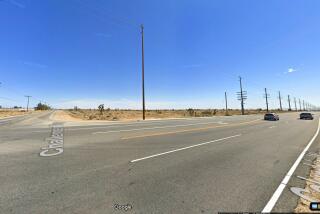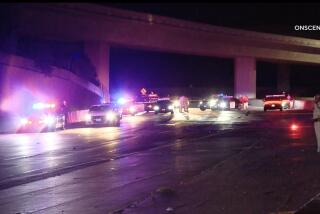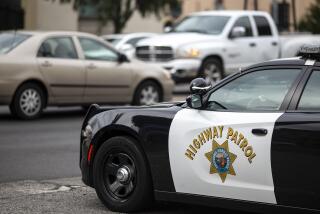Disabled Man Who Hurdled Rules Becomes CHP Captain : Law enforcement: Bob Caldwell lost his legs in a motorcycle accident. At one point, the agency tried to force him out. Now he will run the Verdugo Hills office.
- Share via
Bob Caldwell finally made the one jump that really counted for him.
Caldwell, the California Highway Patrol’s only legless officer, was promoted to captain Monday when he took over the Verdugo Hills CHP station, which oversees the eastern third of the San Fernando Valley and much of the San Gabriel Valley.
The promotion marked a victory long in coming for Caldwell, 52, of Santa Clarita, who had to fight to keep from being forced out of the CHP because he could not pass a jumping test after losing both legs in a duty-related motorcycle accident.
For 10 years after the 1973 accident, Caldwell had been reassigned to desk work. But in 1983, he was almost dropped for being unable to perform the required 68-inch jump.
He held on to his job because state Sen. Ed Davis (R-Santa Clarita)--a former Los Angeles police chief--got the Legislature to pass a law that year allowing CHP officers to seek waivers from the physical requirements.
Caldwell said he is the only officer to have received such a waiver. He has worked since then as a lieutenant in Newhall and Ft. Tejon, and most recently as an administrator in the Glendale office.
“He’s a hell of a good man, and they would have thrown him on the junk heap,” Davis said. “He proved you can do a great job in the CHP without being a broad jumper.”
Caldwell, a San Francisco native, decided on a career in law enforcement after graduating from the University of San Francisco and serving a stint in the U.S. Army. He joined the CHP in 1965 and was assigned to the Los Angeles area.
“I was there about a week, and I was assigned to the Watts riot,” Caldwell said. “I thought it wouldn’t get any worse.”
But it did.
When a rookie officer complained in June, 1973, that his new Harley-Davidson wobbled at high speeds, Caldwell, then a sergeant in the CHP’s Culver City station, insisted on checking for himself. He took it for a test ride on the Marina Freeway.
The cycle did wobble and Caldwell lost control, smashing into a median divider. Both his legs were sliced off above the knee.
Caldwell was fortunate that the first motorist who stopped to help was a nurse from Northridge, joined minutes later by a Gardena doctor. The two of them stanched the bleeding sufficiently to save Caldwell’s life.
His left arm and wrist were broken, gangrene later developed in his gall bladder, his stomach was nearly crushed and he suffered massive internal bleeding.
“I broke everything from the jaw down,” he said.
But Caldwell returned to work on artificial legs six months later. When he walks around his office, the only evidence of injury is a slight limp.
“Most people would have taken the retirement benefits, but not Bob,” said J.J. O’Brien, a retired CHP lieutenant and longtime friend. “He wanted to get back to work so bad he taught himself to drive again instead of waiting for the rehabilitation classes.”
Caldwell has been assigned to a desk ever since, but he hasn’t been out of the action entirely. While he was temporarily in charge of the Newhall station in 1982, the building was gutted by fire. Caldwell was later credited with organizing efforts that kept the station operating without interruption, including saving guns and patrol cars from the flames and getting a dry cleaner to open before dawn to clean smoke-permeated uniforms for the next shift.
His job was threatened in 1983 when the CHP adopted a more stringent standard for physical testing that included a jumping test.
“No matter how much rehabilitation or training I get, that’s something I can never do,” Caldwell said.
CHP officials would not budge.
Davis heard about the matter and was outraged.
“The Highway Patrol could have just changed the rule administratively,” Davis said. “I was shocked that they didn’t initiate efforts to keep this good man.”
His bill passed without opposition, Davis said.
“We had to pass a state law to allow him to continue the job he was most qualified to do,” Davis said. “Kind of silly, isn’t it?”
CHP spokeswoman Alice Huffaker commented, “It wasn’t that the CHP didn’t want to help him--the CHP supported the legislation that allowed Caldwell to be exempted from the physical performance tests.”
But she pointed out: “There are very specific duties that an officer must be able to perform, and these are codified by law. . . . Everyone from the commissioners on down has to take a physical performance test.”
She said it would be “extremely unusual” for another officer to get a waiver such as Caldwell’s. “There were extenuating circumstances in this case.”
It was a bittersweet victory. Caldwell once believed the controversy destroyed any chance he had of being promoted to captain.
“I won the battle, but I was losing the war,” Caldwell said.
O’Brien agreed. “I didn’t expect him to ever make captain, even though he is certainly more capable than some people who have made captain in the past.”
But Caldwell did the best job he could without complaint, O’Brien said, with support from many admirers within the CHP. Along the way, he also learned to ease the tension of his disability through humor.
“He introduced himself to me as the only CHP officer with an adjustable height,” O’Brien said.
“I can’t dribble well enough to play for the Lakers, so I decided to stay with the Highway Patrol instead,” Caldwell said with a laugh.
Sitting in his new office in Altadena, Caldwell said he is not bitter. As an officer trained to enforce the law “by the book,” it was humbling to become entangled in the law himself, he said.
“The whole department learned to become more tolerant of exceptions to the rule,” Caldwell said. “We all deal with rules and laws that bureaucrats write, and sometimes those rules aren’t too fair.”
More to Read
Sign up for Essential California
The most important California stories and recommendations in your inbox every morning.
You may occasionally receive promotional content from the Los Angeles Times.










